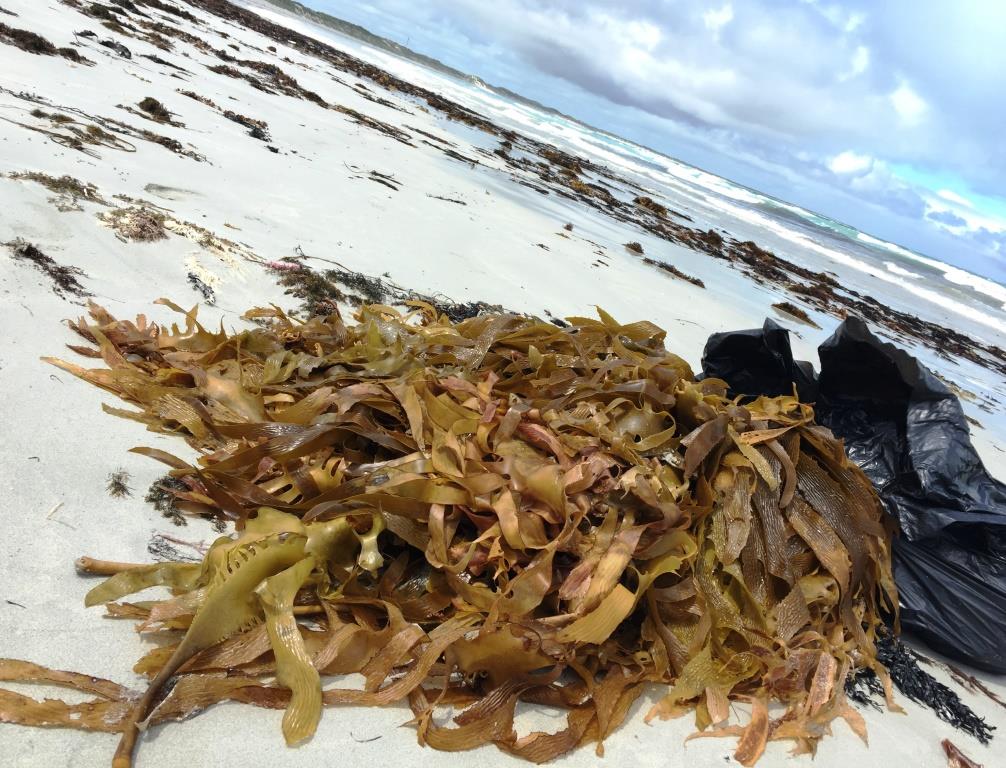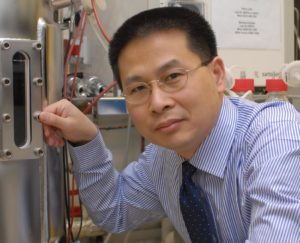

CSIRO senior scientists will join forces with Flinders researchers to bring a new health product to market.
The Flinders NutriThick project is among 10 new science and technology innovations selected for the third round of CSIRO’s ON accelerator program.
Funded as part of the Turnbull Government’s $1.1 billion National Innovation and Science Agenda, ‘ON, powered by CSIRO’ is Australia’s sci-tech accelerator and is designed to fast-track great science and technology innovation from the lab to reality.
Flinders entered the only South Australian research to make the final round of this year’s CSIRO ON Accelerate program which targets promising, innovative Australian science and technology projects that could “shape the nation’s future”.
The Flinders’ Centre for Marine Bioproducts Development (FCMBD) and CSIRO Health and Biosecurity scientists will work with Flinders Partners to explore and market the potential of key minerals in brown seaweed, a plentiful but under-utilised natural resource in Australia.
Non-animal, calcium-rich minerals and other ‘functional food’ supplements are a fast growing market, particularly for ageing populations in the western world and developing countries where food and good nutrition are scarce, says FCMBD director Professor Wei Zhang, from School of Medicine (Medical Biotechnology).
Extracting key nutritional components from Australia’s ‘clean and green’ oceans will tap into lucrative Asian and other export markets with value-added functional food bio-products.
“Australian-sourced natural ingredients are highly prized throughout Asia and other parts of the world,” Professor Zhang says.
“Seaweeds are just one of many sources of marine-based components which could be refined and value-added to meet booming global demand for health-giving functional foods, pharmaceuticals and cosmetics, as well as organic fertiliser, animal feed and biofuels.”
The multi-agency team comprises Dr Damien Belodrajdic and Dr Michael Conlon, from CSIRO Health and Biosecurity, Professor Zhang, Flinders seaweed researcher Peng Su and Dr Rebecca Perry from Flinders Partners, the University’s commercialisation arm.
Professor Zhang, who is president of the Australia-NZ Marine Biotechnology Society, says farmed and wild seaweed are widely used in Asian countries and some parts of Europe as vitamin and mineral supplements.
Seaweed is not only rich in trace minerals and vitamins but a low-calorie source of protein and fibre, comprising up to 20% of the Asian diet. The seaweed food ingredients business is worth an estimated US$1 billion dollars.
The ten big innovations that will be fast-tracked through the third round of ON Accelerate are:
Australian Silicon Photonics (RMIT): A low-cost, low-energy solution for datacentre operators to help them manage increased data volumes while reducing energy consumption and environmental impact;
NutriThick (Flinders University): An easy to drink, non-dairy and non-animal supplement for highly bioavailable calcium based on Australian seaweed that could provide the boost needed by over 1 in 2 Australians that suffer from calcium deficiency.
Going for Gold (CSIRO): A safe and cost effective replacement for cyanide that will allow miners to recover more gold from the precious resource while protecting communities and the environment.
DentalAR (University of Western Australia): Augmented reality for dentists to improve patient treatment and reduce time spent in ‘the chair’.
RadVet (University of Newcastle): A standardised and effective treatment for skin cancer in animals.
Passive Radar (Defence Science and Technology Group): New passive radar technology that will allow the Australian Defence Force to maintain their situational awareness without advertising their presence.
DetectORE (CSIRO): A simple, cost-effective solution for detecting gold in the field that will transform work processes and increase efficiency and returns for geologists.
D-tech IT (CSIRO): New rapid video analysis technology that will allow species identification of fish at the ‘point-of-catch’ to enable safer fishing practices and endangered species protection.
Green and Gold (CSIRO): A new technology that will increase capacity for production of renewable oils from plants to meet growing global demand for food oils, industrial chemicals and renewable fuels.
LuciGem (Macquarie University): New medical technology that uses nano-sized particles of ruby and diamond to ‘light-up’ human systems to ‘see the unseen’ and improve patient diagnosis and treatment.
The research teams will commence a 12 week program to commercialise their research, guided by mentors from industry, science and commercialisation in January 2017 and will culminate in a ‘pitch event’ to industry to secure further funds and partners for commercialisation in April 2017.
The Turnbull Government is also helping researchers to commercialise their discoveries and inventions through the $200 million CSIRO Innovation Fund, which was launched earlier this month.
The CSIRO Innovation Fund will invest in new ventures, some of which may be generated by CSIRO’s ON accelerator – and include exciting new projects such as those announced today.
CSIRO Chief Executive Dr Larry Marshall said the final 10 ON Accelerate innovations “address key challenges in food and agriculture, sustainable farming, minerals and health”.
“The impact these innovations could deliver is enormous and will be felt by all Australians in the form of new jobs, new ways to address some of our biggest social challenges and new opportunities to help industries transitioning disruption to compete and grow,” Dr Marshall said.
“The diversity in teams is testament to our Strategy 2020 to open the accelerator to all publicly-funded research agencies under the National Innovation and Science Agenda, to help fast-track science innovation. Innovation is about navigating ambiguity, diversity is the compass.
The Australian Government has identified the so-called Blue Economy as a new primary industry, with marine-based products projected to be worth up to $100 billion by 2025 assisted by funding through its 10-year National Marine Science Plan.
For more information about CSIRO’s ON accelerator, visit: www.csiro.au/on
For more information on the CSIRO Innovation Fund, visit: www.csiro.au/innovationfund

